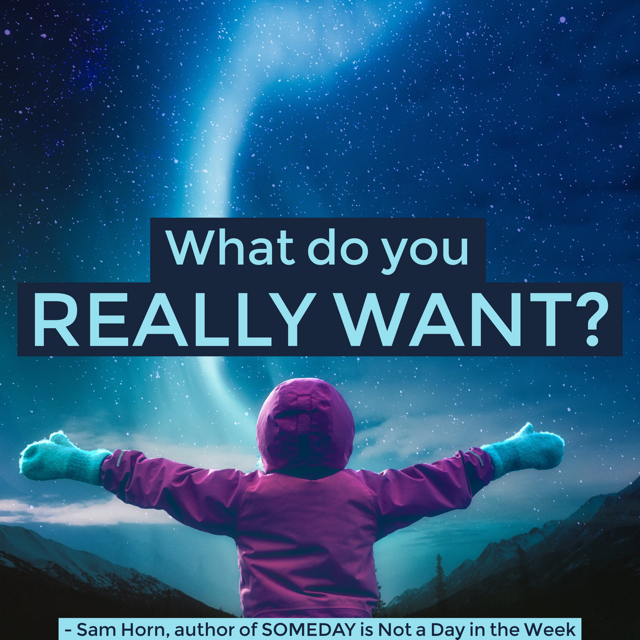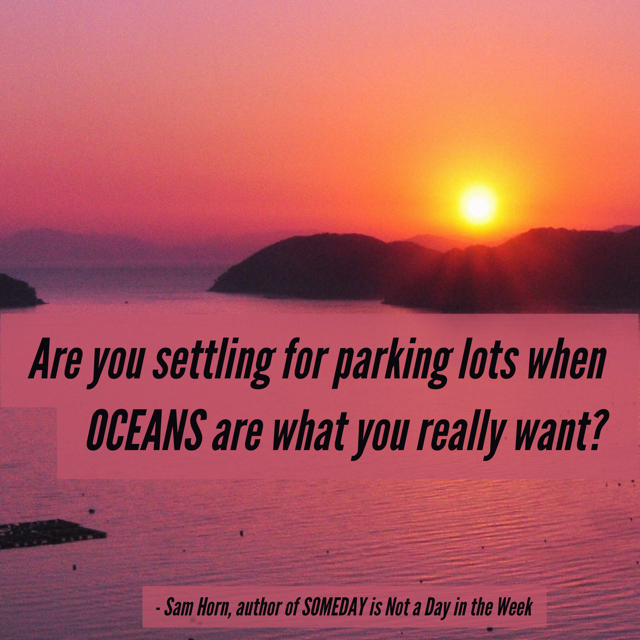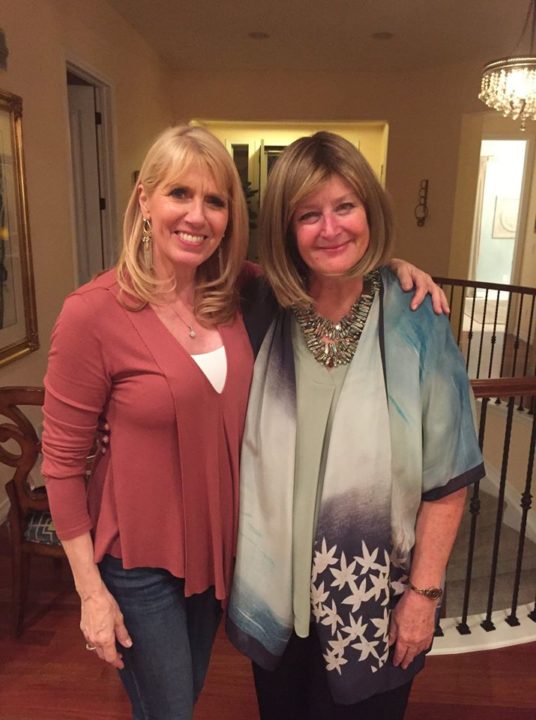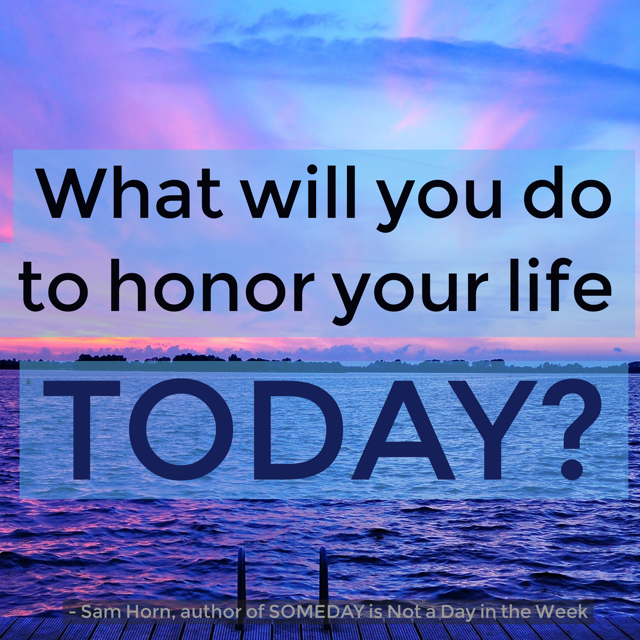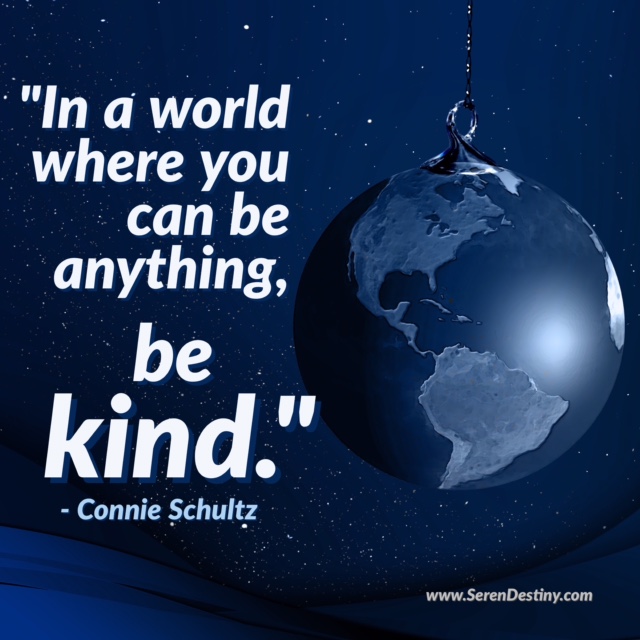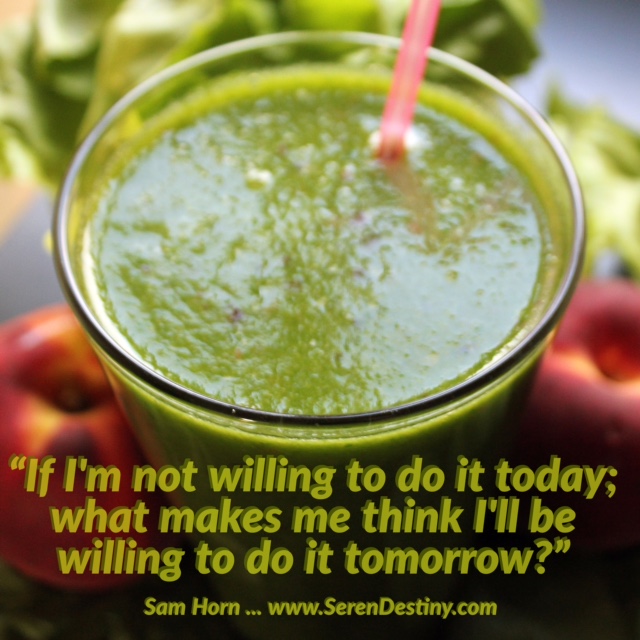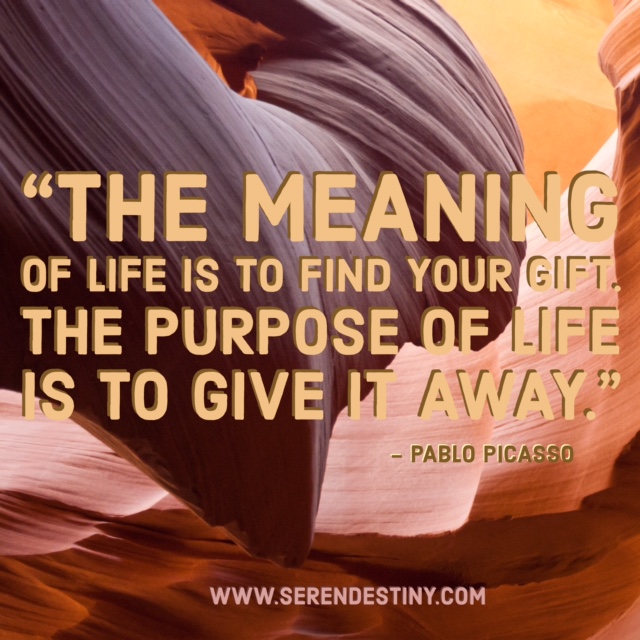Remember, we're all in this ... alone." - Lily Tomlin
Thank heaven, we don't have to be in this all alone. We have the option of going it together. One of the goals of the SOMEDAY is Not a Day in the Week book is to catalyze conversation about what really matters.
Too often, we get busy and weeks (months? years?) go by without us talking about long-term goals or dreams that get pushed aside. It's easy for our values and priorities to get buried in the day-to-day and for resentments to start building up.
That's why I ended every chapter in my new book with 3-4 questions you can discuss with friends or a family member so you can go deep into the insights and talk about how they pertain to your personal and professional life.
Did you relate to the story that opened each chapter? When has that happened to you? What did it bring up for you? Whether it's "driving into hurricanes" or "watering dead plants," how did the real-life examples from myself and others prompt a fresh perspective?
What about the insights, exercises and quizes? Were they relevant for you? How so? What changes will you make - what action will you take - on something that's important to you?
The ten hacks and action steps are designed to elicit epiphanies around your health and happiness. Are you leading a meaningful, purposeful life? If so, how will you continue to do what puts the light on in your eyes? If not, what will you start, stop or do differently?
You might want to work through the book chapter by chapter with a friend, walking group, or book club. Assign a chapter a week (feel free to adapt that to suit your timeline) and lead a discussion where everyone has opportunities to share personal and professional AHA's. You might want to rotate who facilitate's the discuussion so everyone gets a chance.
Many people have told me these questions have led to some of the most honest conversations they've every had. One couple said filling out the Happiness Box together put the affection and romance back in their marriage. She said, "Little resentments had started piling up because we weren't talking honestly about the sacrifices we were making. We posted our Happiness Boxes on the frig so we can see them, update them every week, and figure out how to "swap time off" so we can each do one thing we enjoy."
And if you live or work by yourself and don't have anyone to discuss these questions with, reach out. Maybe there's a college friend you haven't talked to in awhile, a neighbor you used to live next to that you miss, a colleague at a previous job you really enjoyed.
Studies show we're "lonier" than ever. A February 9, 2019 New York Times article IsLoneliness a Health Epidemic? said it's a "sad reality of modern life."
But you can change that. Who is someone you know who would welcome a weekly opportunity to work through these structured questions together? It's an opportunity to talk honestly about what's working in your life, what's not, and what you plan to do about it with people who care, with people who have your back and front.
Research done by Harvard shows that "Relationships are THE key to enduring happiness." A primary point of the book is that meaningful conversation and connection about what matters is what will matter in the long run. WAITING for someone else to make the first move is a prescription for procrastination.
The goal of the SOMEDAY book is to be proactive, not passive, to take responsibility for our own happiness. One way to do that is to create a community you'd like to be part of. Discussing these questions can create a closeness that counteracts the isolation our culture.
One more suggestion? If you've read the book, you know it has more than 200 thought-provoking quotes on how we can create the quality of life we want now, not later.
In addition to answering the questions in this Readers;' Guide, you might also want to select a favorite quote from each chapter and share that with your group. Whether it's Esther Hicks' "My happiness is on me, so you're off the hook," or John Legend's "The future is already here and we're already late," theese inspiring quotes also have the power to provide insight.
And you might want to get the SOMEDAY is Not a Day in the Week Journal(which features a quote a day) so you can hold yourself accountable for reflecting on - and acting on - your intentions so you can turn them into a rewarding reality.
Readers’ Guide for Sam Horn's SOMEDAY is Not a Day in the Week
LIFE HACK 1: EVALUATE Your Happiness History
Chapter 1. Play Hooky for a Day
1. How would you spend your free day or afternoon? What would you do if the people you’re responsible for would be taken care of, and there would be NO repercussions?
2. What are three things you would not do on your day of hooky? Why?
3. What were your answers to the boxes in the Happiness Quiz? Were they surprises?
Chapter 2. Remember the Golden Days
1. What were your top five priorities? What do you spend the most time on? Do your lists
match? If so, how so? How are you able to live in alignment with what matters to you?
2. If your lists don’t match, why? What’s going on to cause the disparity?
3. What questions from the Happiness Interview produced an aha? What insights did you get from delving into what is contributing to, or compromising, your happiness?
Chapter 3. Adopt a Sense of Urgency
1. Which of the reasons people gave for waiting resonated with you? Please elaborate how each particular reason has prevented you from doing what would make you happier?
2. Did you do the pretend S.E.E.? What would you do if you only had a week to live? Is there some way you can actually do that, even part of it, now not someday? How so?
3. When is a time you didn’t wait to do what was important to you? What gave you the clarity and confidence to act instead of procrastinate? How did it make you feel?
4. Who do you know who you think of as “happy?” Who is a shining example of someone who DOES what they want now, not someday? What can you learn from their example?
LIFE HACK 2: GENERATE a Today Not Someday Dream
Chapter 4: Clarify What You Want
1. Were you fortunate enough to have a calling, mission or passion project downloaded to you? What was it? Did you act on it? Why or why not? How has that affected your life?
2. What is the mission statement you crafted? Where will you keep it in-sight, in-mind so it can help you make decisions that are in alignment with your purpose and true priorities?
3. What do you want more of in your life? What would make your life more fulfilling? How you will give time to it to this week – instead of floating and waiting to do it someday?
Chapter 5: Put a Date on the Calendar
1. What would you like to experience or achieve by the end of this year? What is your Today, Not Someday Dream? When will you launch it? What “do-date” did you put on your calendar?
2. Now, start filling in the W’s … where, when, who, what, why. Who will you discuss this with so they can help you fill in the blanks so your dream goes from vague to vividly clear?
3. Where will you post your dream so it stays in-sight, in mind, and you are constantly re-inspired to do what you said you wanted to do?
LIFE HACK 3: ABDICATE Harmful Beliefs and Behaviors
Chapter 6. Just Say No to Nay-Sayers
1. Do you have a nay-sayer who is telling you it’s wrong, foolish, or selfish to pursue your dream? Who is that person? What are they saying? What’s their real agenda? How has this person impacted you, up until now? Have they caused you to question yourself? Have they undermined your clarity, your courage, to grow and move forward?
2. What will you do to speak up for yourself next time this person tries to undermine you? Or, what will you do to disassociate from this person or reduce their power over you?
3. Who is a cheerleader who supports what you’re doing? How does this person help you grow and encourage you to be all you can be? How will you spend more time with this person so they give you the energy, tools, clarity and confidence to proceed?
Chapter 7. Let It Go, Let It Go, Let It Go
1. How do you feel when you walk into your home? Where would your home rate on the Clutter (1) to Clean (10) Scale? How does that affect you? Do you feel guilty, stressed or frustrated with how things have piled up? Or do you feel proud, at peace with how well-designed, organized and beautiful things are?
2. How much time do you spend cleaning, repairing, buying, renovating your stuff? Is that a source of enjoyment, a burden and chore, or something in between? Explain.
3. Are you ready to down-size your home and/or release some belongings? How will you do that? Who else is impacted by this? How will you negotiate this with them? What could you do with the resources that would be freed up when you have less to take care of?
Chapter 8. Stop Driving into Hurricanes
1. Can you relate to the “Why am I driving into a hurricane” story? What commitments are you keeping because you said you would? What are the consequences of that?
2. Is there a time you “broke a promise” and, instead of it being a catastrophe, it actually led to a better situation? Please describe what happened.
3. What is a stormy situation you’re in right now? Do you keep driving into this hurricane because you want to honor your commitment? Can you approach them, tell the truth as fast as you can, and explore options that have the potential to be a win for all involved?
LIFE HACK 4: INITIATE Daily Actions that Move Your Life Forward
Chapter 9. You Don’t Have to Know to Go
1. Do you see yourself as brave? Why or why not? When is a time you tried something new and it worked out well? How can you tap back into that confidence and tell yourself, “If I did it before, I can do it again?”
2. Were you brought up to see the world as a scary, dangerous place or a safe, adventurous place? How has that impacted your willingness to venture out on your own?
3. What is something new you want to try? Are you getting conflicting advice? What’s your gut telling you? What if you took the bolder of the options and figured it out on the way?
Chapter 10. Honor the Nudges, Connect the Dots
1. Do you make room for whims? Why or why not? When was a time you honored a nudge and acted on your intuition? What happened as a result?
2. Do you think this is a lot of hooey? Does your intellect over-ride your instincts? Or, do you agree that if we have a sixth sense that alerts us to what’s wrong, we also have a sixth sense that alert us to what’s right? What are your beliefs about this?
3. How will you honor the instincts that have your best interests at heart? How will you connect the dots, act on “coincidences” that beat the odds, and align with aligned individuals and opportunities that show up that “feel right?”
Chapter 11. Put Yourself in the Story
1. Would you say you’re putting yourself in your own story? How so?
2. When or how do you take yourself out of the story? Why?
3. What was modeled for you about serving others? How has that supported or sabotaged your happiness? How will you strike a healthier balance between serving others and yourself? What is something you’ll do “just for yourself” this week?
Chapter 12. Prevent the Rubber Band of Routine from Snapping Back
1. Have you found, despite your best intentions, that the Rubber Band of Routine snapped back and you’ve reverted to old ways? How so?
2. How will you use language to focus on what you do want instead of what you don’twant? For example, how could you turn empty days into open days?
3.What metrics will you assign to your dream so you have a measurable way to hold yourself accountable? How will you give yourself a “second chance” to get this change right and persevere to bring your life into alignment with your true priorities vs. reverting to old habits?
LIFE HACK 5: CELEBRATE What’s Right with Life, Right Here, Right Now
Chapter 13. Live in Day-Right Compartments
1. Do you have a morning practice? If so, what is it? If not, why not?
2. Do you find yourself getting caught up in the busyness of the world? Do you feel you’re losing connection with yourself and others? How so?
3. What will you do to create a mindful ritual in the morning to get your day off to a good start? How will you belly-breathe or bring your mind to the present moment by using a SOMEDAY journal (or the equivalent) to keep the Happiness Hacks top-of-mind?
Chapter 14. Get Out of Your Head and Come to Your Senses
1. When was the last time you saw something as if for the first or last time? Describe what happened and what it felt like.
2. Do you have a busy, stressful life? What is the ongoing impact of rushing, rushing, rushing and always feeling “an hour late and a dollar short?
3. Would you say you have “juice” in your camera? Do you look at the world with fresh eyes? When, where and how will you get out of your head and come to your senses?
Chapter 15. Get a Move On
1. Would you say you appreciate your freedom of movement or do you take it for granted? What are you currently doing to take care of your body and health? Elaborate.
2. What are you doing that is harming your body or jeopardizing your freedom of movement? Sitting? Smoking? Eating and drinking the wrong things? What?
3. Do you have a car? Is it a source of frustration or a source of freedom? When and where will you go for fun – by walking, driving, biking, flying or training - because you can?
Chapter 16. Free Up Time for Fun
1. What do you do for fun? Do you have a hobby? Play a sport? Sing? Garden? What?
How often do you do this? How does it contribute to the quality of your life?
2. What did you USE to do for recreation? Is that out of your life now? Why? Do you feel it’s frivolous, that you have more important things to do? Explain.
3. How will you carve out time to have a good time? How will you bring more joy into your life? When, where and how will you do something that puts the light on in your eyes?
Chapter 17. Be Wealthy in What Matters
1. Growing up, what were the messages you received about money?
2. On a scale of 1 – 10, how satisfied are you with the amount of money you make and have? Do you have “enough” or is lack of money undermining your quality of life? Explain. What is your “number?” What do you envision happening when you reach it?
3. How are you wealthy in what matters, right here, right now? Give an example of what you will do to imprint and appreciate your “good fortune” this week. Has a dream come true and you haven’t really acknowledged it? How will you rectify that?
LIFE HACK 6: AFFILIATE with People Who Have Your Back and Front
Chapter 18. Launch Your Ship in Public
1. So, what is that venture you want to launch? Who has supported you, cheered you on? What have they done to help you achieve your goal and do what’s important to you?
2. Who has cautioned you, told you (“for your own good”) that what you want to do won’t work or isn’t a good idea? What impact has that had on you?
3. How will you take your dream public and give others a chance to jump on your bandwagon? Will you create a vision board and/or host a Today, Not Someday party? Where did you post your vision so it stays in-sight, in-mind?
Chapter 19: Create a Community of One
1. When was a time you had a room – or road – of your own? What did it mean to you? Where do you go now to escape? What do you do there? Why is it important to you?
2. Ae you an introvert, extrovert or ambivert? How do you take responsibility for getting the right mix of being social and being solitary?
3. Can you be alone without being lonely? Are you comfortable going places by yourself because you can connect with your surroundings and turn strangers into friends? How so?
LIFE HACK 7: INTEGRATE Your Passion and Profession
Chapter 20. Blend Your Work and Recreation
1. Did you used to see your work and recreation as separate? If so, why so? If not, how did you get clear you could have the best of both worlds by combining them?
2. What skills, talents, hobbies do you have that you can integrate into your work? How can you integrate your passion and purpose into your profession so it benefits all involved?
3. What do you currently work hard at? How, like the realtor/tennis player, can you combine your job and joy and make it more rewarding now, not later?
Chapter 21. Don’t Wait for Work You Love; Create Work You Love
1. Do you love your job? Do you feel you’re adding value and contributing? How so?
2. If you don’t find your work satisfying, why not? What talents or skills are you not having an opportunity to use or get credit for?
3. What are your Four I’s? How could you leverage them into a paying career where you get paid to do it for others – or teach it to others? What is your next step? Will you visit crafts fairs to see how people have turned a passion into a profession? Elaborate.
LIFE HACK 8: NEGOTIATE for What You Want, Need and Deserve
Chapter 22. Stop Trying to Make People Happy; You’re Not Chocolate
1. Are you too nice for your own good? Are you a people-pleaser who orders pasta you don’t want? How so? How does this impact you and the people around you?
2. Have you been taking yourself out of the picture – and habitually putting others first? Was that modeled for you growing up? Why do you do that? What are the consequences?
3. What is a specific situation where you haven’t been clear about what you want? How will you rectify that by saying what YOU want up front, now and in the future?
Chapter 23. If You Don’t Ask, the Answer’s Always NO
1. When is a time you asked for something you wanted – whether it was a promotion, project lead or pay raise? How did you prepare? What was the result?
2. When is a time you waited for someone to “do the right” thing, act on your behalf or give you what you deserved? As Dr. Phil would say, “How’d that work for you?”
3. What is a situation you’re unhappy with right now? Which of the Four A’s have you used? How will you alter the situation by using the 5 P’s of Persuasion to increase the likelihood of improving this situation?
LIFE HACK 9: INNOVATE a Fresh Start
Chapter 24. Quit Watering Dead Plants
1. Is the majority of your life out of your control and not to your liking? How so? Does this challenging time have a timeline? Can you “make your mind a deal it can’t refuse” so you are able to keep things in perspective?
2. What do you currently do to maintain a positive perspective, to have something to look forward to in bleak times? How do you stay focused on what you CAN control?
3. Are there dead plants you can stop watering? What can you quit that is compromising your quality of life? How can you innovate a fresh start if you are going through dark times to keep the light on in your eyes?
Chapter 25. Do the Opposite of Your Always
1. Would you describe your life, career or long-term relationships as an aircraft carrier? How so? Is it a successful carrier? Are people counting on you to stay on the carrier?
2. Are you ready to fly off your carrier now and then so you can be by yourself or so you can be yourself? Where on earth would you like to go? What do you want to do?
3. What is a local place that could be your Utah, the Third Place where you could go to work on a priority project? When will you go there? What will you work on there?
LIFE HACK 10: RELOCATE to Greener Pastures
Chapter 26. Give Yourself a GFS - Geographic Fresh Start
1. Would you say you’re a roots person or a wings person? What does that mean to you?
2. Are you happy where you are in your current home? In your neighborhood, city and state? If so, what do you like about it? If not, what don’t you like about it?
3. If you could move, where would you go? What would it take for you to move? Imagine it in full detail. Write out the steps to move this from being a vague idea to a vivid reality.
Chapter 27. Come Full Circle
1. When was the last time you were in your hometown? What memories did it bring back? Did you reconnect with people that influenced you? Did it catalyze a new creative direction that could be a satisfying full-circle way to come home to who you truly are?
2. What used to light you up, but it feels like it might be a retreat or regression to “go back there?” Do you worry it’s thinking small instead of thinking big? Could it actually be you’re going “home” to who you are at your core, your best self?
3. Do you agree with Ram Dass that we can be “at home” wherever we are and that “home” is a mindset, not a location? Where do you feel most at home?
Chapter 27. Welcome What’s NEXT
1. Are you ready for a fresh start, for a new adventure? What NEXT could put the light on in your eyes?
2. Do you agree with philosophers that living in the now is the miracle – or do you believe happiness can be a balance of the past, present and future?
3. How will you keep your antenna up for a NEXT that’s in alignment with your values and priorities? What will you say to yourself when that opportunity arises so you act on it?
Hope you're found these questions inspiring, insightful and useful. Even more importantly, I hope they've motivated you to get crystal clear on your values and priorities, and that you've taken steps to create a life that is in alignment with them now, not someday.
- - -
Sam Horn, CEO of The INTRIGUE AGENCY and TEDx speaker, is the author of POP! , Tongue Fu! and Washington Post bestseller Got Your Attention? which have been endorsed by Tony Robbins, Seth Godin, Dan Pink, Marshall Goldsmith, quoted in New York Times, Forbes and Fast Company and presented to National Geographic, NASA, Intel, Cisco, Capital One, YPO. This Readers Guide is from her latest book SOMEDAY is Not a Day in the Week, endorsed by Geneen Roth, Dorie Clark, Kamal Ravikant and Sheri Salata (fomer Executive Producer of The Oprah Winfrey Show) who says Sam is "one of the brighest lights and most accessible wisdom-sharers in our culture today."











